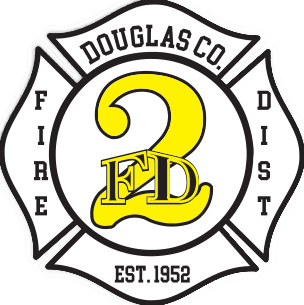Pets, horses, and livestock are also susceptible to difficulties from hot weather. Animals do not perspire and rely on panting, wetting down, shade, cool earth, and drinking water for cooling. Animals cannot explain their needs, so it is up to people to see that their needs are readily met, especially during periods of extreme or prolonged heat.
During this time of excessive heat, Douglas County Fire District No.2 recommends that you asses your daily activities and discuss heat safety precautions with family, neighbors and co-workers.
If your home does not have air conditioning, choose a cool place to visit or stay during the hottest part of the day. Schools, libraries, theaters, and other community facilities can often provide an air conditioned refuge.
Fire fighters encourage everyone to:
•Learn the risks.
•Prepare members of your household, pets and your workplace.
•Plan to get relief from and avoid the effects of heat.
You should plan in advance to wear lightweight, light-colored clothing that covers as much of your skin as possible as well as a well-ventilated hat with a wide brim. Light colors will reflect away the sun’s rays. Stay in the shade as much as possible and remain well hydrated.
When at work or on the road:
•Never leave children or any infirm person or pet alone in a vehicle for even a brief moment. Temperatures inside a closed vehicle can reach more than 140 degrees Fahrenheit within minutes. Exposure to such high temperatures can quickly kill a person or pet. Even on days that feel pleasantly warm outside, temperatures in a parked vehicle can raise high enough to kill. Leaving a window open will not necessarily abate the danger.
•If you discover a child or incapacitated person locked inside a car on a hot day, call 9-1-1 immediately!
Fire fighters suggest you slow down and avoid strenuous activity:
•Reduce, eliminate, or reschedule physical activities for a cooler part of the day. High- risk individuals should stay in cool places, and everyone should get plenty of rest to allow the body’s natural “cooling system” to work.
•Hot days also mean sunny days, and regardless of your skin tone, it’s a good idea to protect your self by applying sun block early and often.
•If you must perform strenuous activity, do so during the coolest part of the day, which is usually in the early morning. Many heat emergencies occur to people who are exercising, working or staying alone. We suggest you use a buddy system, and also check regularly on elderly, disabled or at-risk neighbors.
•Experts also suggest that you eat smaller meals more often, and drink plenty of fluids even before you feel thirsty. Your body needs water to keep cool. Water is the safest liquid to drink during heat emergencies. Avoid drinks with alcohol or caffeine. They make the heat’s effects on your body worse.
Your Neighborhood Fire Fighters will be keeping a close eye on local weather trends, including the fire weather. You can help them by remaining cognizant of the health and safety dangers of hot weather, and keeping those in your home, neighborhood and workplace safe until cooler weather prevails.
